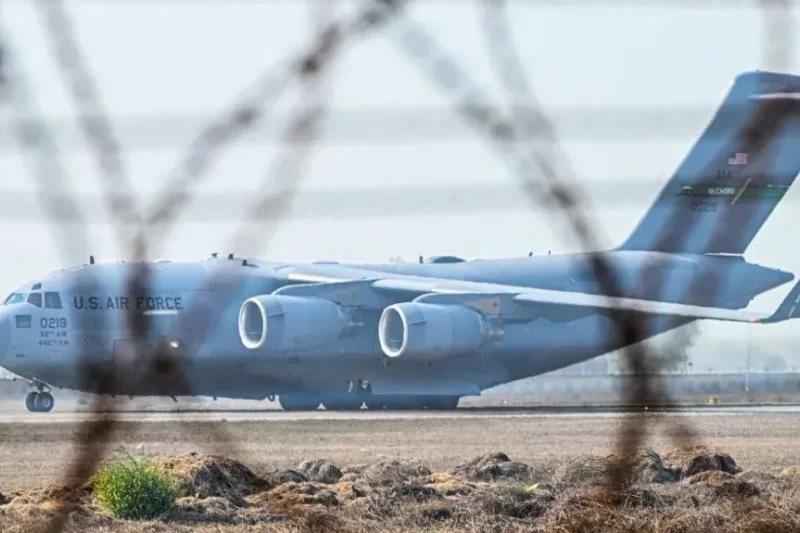US Military Plane Carrying Deported Indians Lands in Punjab
A US deportation flight carrying about 100 Indian nationals accused of entering the country illegally has landed in the state of Punjab.
The military aircraft, which left Texas late on Tuesday, is now in the city of Amritsar where authorities say they have put measures in place to process the deportees.
President Donald Trump has made the mass deportation of undocumented foreign nationals a key policy. The US is said to have identified about 18,000 Indian nationals it believes entered illegally.
Trump has said India's Prime Minister Narendra Modi had assured him that the country would "do what's right" in accepting US deportations.
Authorities in Punjab say they have set up special counters to receive the deportees, adding the individuals would be treated in a "friendly" manner.
Journalists have gathered outside police barricades near an Indian Air Force building in Amritsar.
There are 104 Indian deportees on the flight and they will be processed separately from regular passengers before boarding buses to their home states, including Punjab, Haryana, Chandigarh, Uttar Pradesh and Gujarat.
Trump is increasingly using US military planes to return individuals to their home countries.
However, deportation flights to India are not new. In the US fiscal year 2024, which ended in September, more than 1,000 Indian nationals had been repatriated by charter and commercial flights.
In October, US Immigration and Customs Enforcement (ICE) deported more than 100 Indian nationals who lacked legal grounds to stay in the US on a chartered flight, part of a rising trend in removals to India.
That flight carrying adult men and women was also routed to Punjab, close to many deportees' places of origin. No precise breakdown of hometowns was provided.
Much of the migration from India to US appears to originate from the Sikh-dominated state of Punjab and neighbouring Haryana, which has traditionally seen people migrating overseas. The other source of origin is Gujarat, Modi's home state.
"That has been part of a steady increase in removals from the US of Indian nationals over the past few years, which corresponds with a general increase in encounters that we have seen with Indian nationals in the last few years as well," Royce Bernstein Murray, assistant secretary at the US Department of Homeland Security told a media briefing in October.
Encounters refer to instances where non-citizens are stopped by US authorities while attempting to cross the country's borders with Mexico or Canada.
A total of 5,477 Indians have been deported from the US by ICE between 2018 and 2023, according to official figures. More than 2,300 were deported in 2020, the highest in recent years.
The number of undocumented Indian immigrants in the US is disputed.
New data from Pew Research Center estimates 725,000 people as of 2022, making them the third-largest group after Mexico and El Salvador.
In contrast, the Migration Policy Institute (MPI) puts the figure at 375,000, ranking India fifth among origin countries. Unauthorised immigrants make up 3% of the US population and 22% of the foreign-born population.
In November, 1.44 million non-citizens in the US remain on ICE's "non-detained docket with final orders of removal", according to an ICE document, accessed by Fox News.
The highest numbers come from Honduras, Guatemala, El Salvador and Mexico, each with over 200,000 individuals awaiting deportation.
China has 37,908 cases, while India has 17,940 on the list.
The ICE document says the US government expects foreign nations to accept their citizens but faces resistance.
ICE currently classifies 15 countries as "uncooperative", including China, India, Iran, Russia and Venezuela. Eleven others, such as Iraq, Nicaragua and Vietnam, are considered at risk of non-compliance.
"Factors that could lead to a country being classified as uncooperative include hindering ICE's removal efforts by refusing to conduct consular interviews when necessary; refusing to accept charter removal missions; having an unacceptable ratio of releases when compared to removals and/or unacceptable average time from executable final order of removal to removal; and/or denying or delaying issuance of travel documents, such as passports," the document says.
India's foreign ministry spokesperson Randhir Jaiswal said recently that India was "firmly opposed to illegal migration, especially as it is linked to other forms of organised crime".
"As part of India-US migration and mobility cooperation, both sides are engaged in a process to deter illegal migration, while also creating more avenues for legal migration from India to the US. We are keen to continue this cooperation.
"At the same time, the government of India would need to do the required verification, including nationality of the concerned individuals before they are deported to India."
Last year, under former US President Joe Biden, 271,000 migrants were deported to 192 countries.
(Source: BBC)













